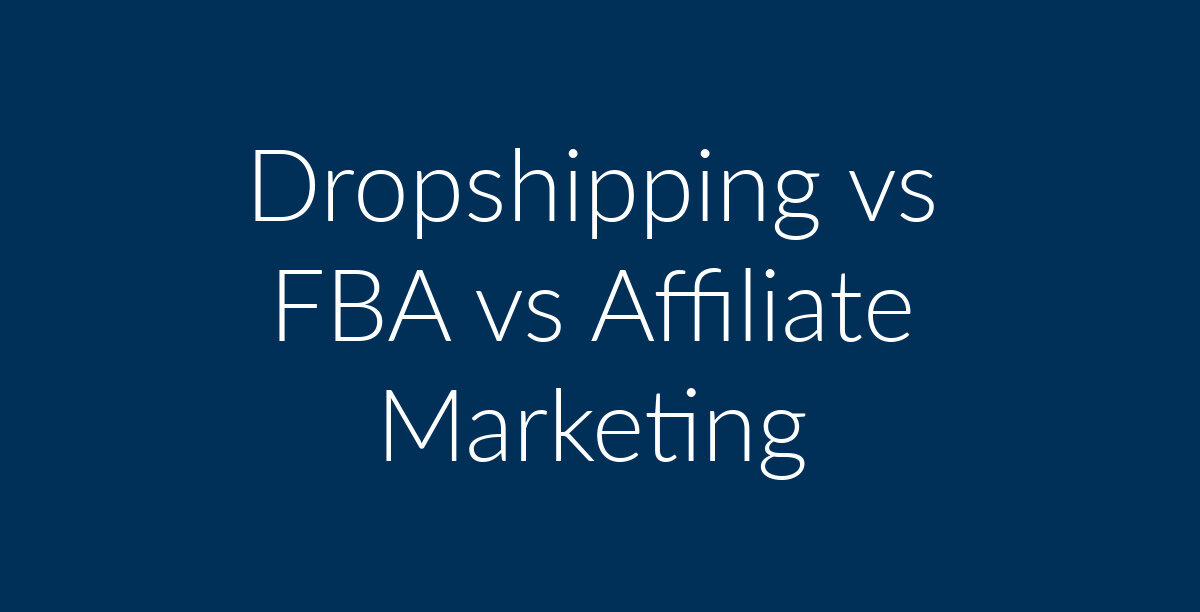Are you the owner of a small business?Have you been wondering which to choose, between dropshipping, FBA and affiliate marketing? If yes, then you have definitely come to the right place. My name is Francisco, and I am the owner of Planet Marketing, a Digital Marketing Agency. My company specializes in Facebook Ads, Google Ads and Remarketing. I have been in business for over a decade and fully understand that many new companies struggle when it comes to the dropshipping vs FBA vs affiliate marketing debate. In this article, I am going to;
- Explain what is meant by dropshipping
- Define FBA
- Define affiliate marketing
- Help you choose the best option for your business
What is Dropshipping?

Running a retail business is not any easy task. That’s particularly the case if you sell a wide range of goods. Let’s assume, here that you have just launched an online store selling men’s clothing. Not only will you have to find the right products to fill up your inventory, but you will also need to handle the costs and risks of stocking the goods that you are selling. But, isn’t there a way that you could avoid this responsibility while retaining the benefits of selling a wide range of goods in your store? Fortunately, this is where dropshipping comes into play? But what is dropshipping and how is it useful, particularly for small businesses?
Definition of dropshipping
Dropshipping is a business model where retailers do not actually keep in stock the goods that they have in their inventory. Instead, when a customer buys goods from a company that’s does dropshipping, the company buys the goods from a third party company. The goods are then shipped directly from the third party to the buyer without ever reaching the seller.
Advantages of Dropshipping
Dropshipping comes with a number of advantages, particularly for small businesses;
- You avoid storage costs and the risks that are associated with keeping large quantities of goods in your shop.
- Dropshipping means that small businesses do not need that much capital to get started. Indeed, all that you need is investment into designing and launching an eCommerce website. Usually the cost is, therefore, simply that of buying an eCommerce platform such as Shopify.
- You get virtually none of the headaches associated with the need to keep moving stock. If something in your inventory does not sell, your only loss will be in the form of missed revenue. What is done to dispose of the unsold goods is not your concern.
- You can sell a high number of goods from various suppliers. You are not restricted, in this regard, by storage and other concerns.
- Your operations are not restricted by location. All that you need to do is keep in touch with your suppliers and customers, and this can be done from any part of the world.
Disadvantages of Dropshipping
Though dropshipping is a wonderful way for people to run businesses without having to worry about investing large sums of money towards the purchase of stock, there are a couple of disadvantages in this method of doing business;
- Low profit margins: Your profit margins are restricted by the fact that it’s so easy to start a dropshipping business. There are probably countless other people who are doing what you are doing. Price, therefore, becomes a competing point. If you try to sell a product that you bought for $5 at $30, you will probably have very few sales.
- No knowledge about what you are selling: If your supplier neglects to give you all the information that you need about a product, this may put you in the cross-hairs with your customers should the products turn out to be defective.
- Customer service is limited: You are likely to refer most of the concerns that are raised by your customers to your suppliers. Again, this creates a potentially explosive situation where your description of a product does not match reality.
Fulfillment by Amazon (FBA)

FBA stands for Fulfillment by Amazon. The service has some similarities with dropshipping. Should you choose to go the FBA route, you also do not stock the goods that you sell. Instead, the goods are stored in Amazon’s fulfillment centers. When someone buys something from you, Amazon then packs and ships the product to the customer. However, there is one huge difference between dropshipping and FBA;
Difference between dropshipping and FBA
The difference between dropshipping and FBA lies in the sourcing of goods. With FBA, you actually need to find suppliers for the goods that you are interested in having shipped from Amazon’s fulfillment centers. Let’s say you sell mobile phones and have found a supplier in China. What happens then is that you purchase the goods from China and have them shipped to Amazon. And therein lies the difference.
With dropshipping, there is really no huge capital investment into the purchase of stock. With FBA, on the other hand, it’s you who is responsible for stocking up on the goods that you sell. Amazon’s responsibility is restricted to warehousing, packing, shipping and providing customer support for the goods your goods.
FBA advantages;
The following are some of the advantages of the Fulfillment by Amazon (FBA) program;
- You get time to grow your business: You do not have to worry about packaging and shipping goods to your customers. You also do not need to worry about customer support. All of these activities are handled by Amazon.
- The Amazon Brand: Amazon is a household name across the globe, and joining the FBA program allows you to tap into the goodwill that surrounds the brand.
- Higher profit margins: With FBA, your profits a higher when compared to dropshipping. This has to do with the fact that Amazon is such a huge brand, and people will be more willing to make purchases at a higher price.
FBA disadvantages
- Difficult Inventory Management: The goods that are in Amazon’s warehouses remain your goods. If you do not properly manage your inventory, you can easily lose track of what remains and what has been sold.
- Competition: The FBA program is open to everyone. You are, therefore, likely to face fierce competition, whatever it is that you sell.
- At Amazon’s mercy: Your very existence depends on Amazon’s magnanimity. Should they decide to change their policies, then you may very well lose your business.
- No contact with your customers: For all intents and purposes, your customers belong to Amazon. They are the ones who handle customer support. You are, therefore, not able to cultivate the kind of relations with your customers that are essential for the growth of any business.
Affiliate Marketing

Now, we get to the affiliate marketing section of the dropshipping vs FBA vs affiliate marketing debate. Let me say; affiliate marketing is a subject that I am very familiar with. Not only am I an affiliate for other brands, but I also run my own affiliate marketing program in-house. Planet Marketing sells a number of digital marketing products, including a Facebook Ads Marketing Course, SEO plans and Google Ads Plans. I have people around the globe marketing these products on my behalf. But what is affiliate marketing and how can you use it to help grow your business?
What is affiliate marketing?
Affiliate marketing is a business model where brands use affiliates; people and businesses who are located around the world, to sell their goods and services. Affiliates are paid when a set outcome has been achieved. This could be a sale, a signup or any other outcome. Over the years, affiliate marketing has proven to be a reliable way of starting legitimate online businesses. Promotion of products and services by affiliates is usually done via websites and blogs.
Advantages of affiliate marketing
I have previously written a comprehensives affiliate marketing guide. Feel free to check it out by following the provided link. One of the things that you need to understand is that affiliate marketing has two sides; that of the affiliate and that of the vendor. In this article, we are assuming that you are a small business that’s looking to become an affiliate for other businesses. In that case, the following are some of the advantages of affiliate marketing;
- You do not need to spend a lot of money developing
products and services. Affiliates sell other people’s products and services.
All that you need to do is find customers, and you will be paid a commission. - You do not need to worry about shipping, storage
and other costs that are associated with running a business that produces goods
and services. - You are not restricted as to the number of
brands that you can work with.
Disadvantages of affiliate marketing
- No brand recognition: In fact; you may not even have a brand to speak about. All that you are doing at the end of the day is selling goods and services for other people.
- You do not have control over the goods and services that you are selling.
- There is also a glut in terms of the number of affiliates in some areas. This makes it difficult for you to make a breakthrough. An example would be web-hosting. You will need miracles to make a breakthrough in this area since there are so many well established players.
Dropshipping vs FBA vs Affiliate Marketing: Which one should you choose?
Your choice, at the end of the day, is going to depend on a number of factors. The following guidelines should help you make the right decision;
- Choose dropshipping and/affiliate marketing if
you have limited capital for your business. In the two instances, all that you
need to get going is usually the cost of setting up a website. - Go for FBA if you have your own products that
you are selling. In that case, Amazon will handle the process of storing and
getting your products to your customers. - Dropshipping and affiliate marketing are good
for those that wish to only sell other people’s products. The only money that
you are going to spend is on advertising, whereas with FBA, you need to spend
on inventory.



